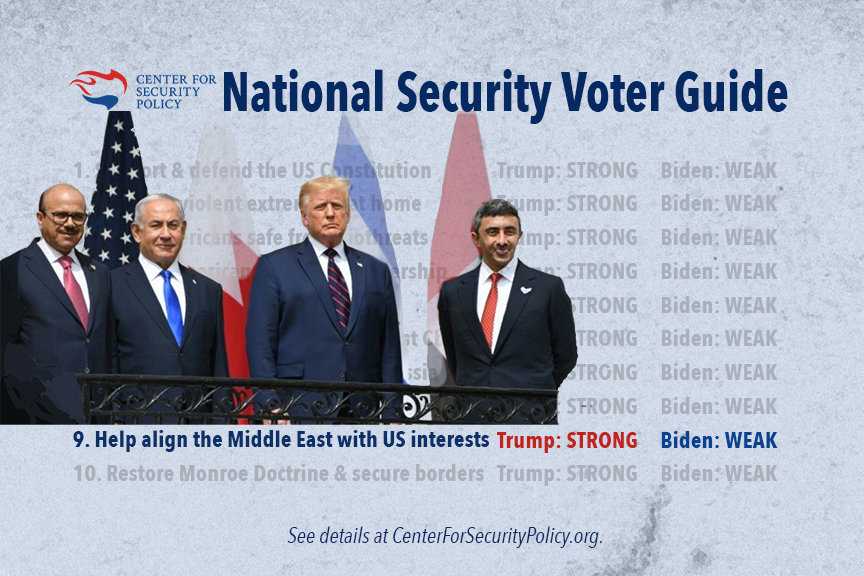National security rating #9: Help align the Middle East with US interests

The greater Middle East – Arab and North African countries plus Israel, Turkey, and Iran – has been the source of immense American investment in military commitments since World War II. Its many cultural, ethnic, religious, tribal, economic, and geopolitical challenges, and the immense energy wealth in the region, have challenged America’s best diplomats and strategists for decades.
Helping align the greater Middle East with American national interests is therefore on the Top 10 of the Center for Security Policy’s 2020 National Security Voter Guide.
We assessed the candidates’ Middle East approaches as follows: mitigation of large-scale threats posed by state-sponsors of jihadist terrorism and subversion (Qatar, Turkey, and Iran); destruction of violent jihadist movements (ISIS, Hezbollah, Libyan jihadists and others); withdrawal of US forces from endless war (Syria, Iraq, and by extension, Afghanistan); support for a sovereign and self-sufficient State of Israel; support for reforms in Arab countries, especially Egypt and Saudi Arabia; effective subjugation of the Islamic Republic of Iran and its military aggression; and the Iran Deal.
Joe Biden. Joe Biden supported a premature withdrawal from Iraq that resulted in the creation of the ISIS terrorist caliphate in northern Iraq and Syria, resulting in a new war in Syria in which the Obama-Biden administration felt force to resort to Vladimir Putin in Russia for assistance. Biden opposed the raid to capture Osama bin Laden that resulted in his death. As part of the Obama administration he supported the US alliance with the Muslim Brotherhood and defended Qatar, the Islamist state sponsor of terrorism. Biden is a longtime supporter of Israel, favoring the socialist coalition and generally opposing the Likud coalition of Benjamin Netanyahu. Biden’s support for “reform” in Arab countries was to support the Muslim Brotherhood to topple the pro-US government of Egypt and destabilize Saudi Arabia, and to destabilize the fractured Saudi government internally and against its resistance to Iranian-backed forces in Yemen, while at the same time backing the Iran Deal to provide the mullahs with cash in exchange for promises. Politico referred to Biden as “more dovish” than Hillary Clinton.
Donald Trump. Donald Trump inherited the wars in Iraq, Syria, and Afghanistan. After giving the military carte blanche to wipe out ISIS, he vowed to wind down the wars and withdraw US forces in an orderly way to make the most of bad situations. His historic “Drive Them Out” speech in Riyadh exhorted Arab countries to stomp out Islamist movements and regimes, aimed at the Muslim Brotherhood and Qatar. He is arguably the strongest supporter of Israel of any American president. He has been a strong supporter of the anti-Islamist and pro-Israel government in Egypt. He destroyed ISIS on the ground in Syria and Iraq, severely crippled Hezbollah by killing its main sponsor, the charismatic Iran Quds Force leader Qassem Soleimani; and is presently helping Israelis and Arabs bring Hamas somewhat to heel under the unfolding normalization of relations between Israel and the United Arab Emirates and Bahrain. He helped stabilize Saudi Arabia with a lenient policy that Biden opposed. His elimination of Soleimani was a bold and shocking blow to Iranian regime capabilities. He pulled out of the Obama-Biden Iran Deal and squeezed the Iranian economy further, helping foment further unrest against the mullahs.
Help align the Middle East with US interests verdict – Trump: Strong. Biden: Weak.
- Chinese spies ‘sham marriage’ scandal exposes ‘targeted’ national security threat at major US base: Waller - January 27, 2026
- The “Donroe Doctrine” In Action - January 7, 2026
- Is Cuba Ready to Fall? - January 7, 2026
